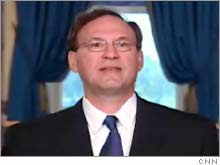 |
| Judge Samuel Alito, President Bush's latest nominee for Supreme Court Justice |
|
|
|
NEW YORK (CNN/Money) -
Political observers are bracing for a firestorm with President Bush's most recent nomination to the Supreme Court, but business groups are likely to back the candidate hailed for his staunchly conservative record.
Samuel Alito, a federal appeals court judge from Philadelphia, was nominated to replace retiring Supreme Court Justice Sandra Day O'Connor Monday morning -- the third attempt to fill the position after John Roberts was confirmed to replace chief justice William Rehnquist and Harriet Miers withdrew herself from the nomination after Bush's fellow conservatives lambasted the choice.
Unlike Roberts and Miers, who have established reputations as corporate-friendly, Alito is known more for his social rulings than his business record. Still, observers said its unlikely that business groups will view his nomination as anything other than positive.
Judicial philosophy geared more towards business
"Alito's record will bear out that he faithfully interprets the constitution and understands that it comes first and the role of the court should be modest," said Marshall Manson, spokesman for the conservative Coalition for Fair Judiciary. "As businesses look at the court nomination, this philosophy will be key."
And Greg Valliere, chief strategist for Stanford Washington Research Group, added that it's unlikely that Alito would have been nominated if his judicial philosophy wasn't geared towards business interests.
In fact, the White House was reported to have consulted business groups such as the U.S. Chamber of Commerce and the National Association of Manufacturers, headed by former Michigan governor and Bush friend John Engler, over potential nominations in order to garner support for what many see as an uphill battle to seat a conservative judge to replace moderate O'Connor.
And Alito -- who has been compared to Justice Antonin Scalia and dubbed "Scalito" in honor of those similarities -- has already proven that he falls on the conservative side.
While he is probably best known for his dissenting argument in Planned Parenthood v. Casey, in which he argued that women should be required to inform their spouses before having an abortion, he has also argued against Congress regulating private machine gun possession. Alito's dissent to a 1996 ruling that upheld the constitutionality of a federal law banning the possession of machine guns suggested that was no proof that private intrastate possession of machine guns caused more crime to the point that it impacted interstate commerce.
Jonathan Turley, professor of law at George Washington University Law School, said that the dissension in that case should indicate his narrow view on interpreting the constitution and his favoring of commerce.
Despite the likely support from Corporate America, judicial observers expect a bruising fight within the Senate before Alito can be confirmed. And a filibuster is likely as Democrats jump to the forefront of the battle after allowing Republican conservatives to take the lead in the fight against Harriet Miers.
"This is not a slam dunk for the president," said Stanford Washington Research Group's Valliere. "Democrats are going to come out swinging and he will not be portrayed as a mainstream conservative but rather someone who is a radical."
A blemish on the record
But more than ideological concerns, Alito has been accused of conflict-of-interest in the past, which opponents may use to thwart the nomination,Turley said.
Three years ago, Alito upheld a lower court's dismissal of a lawsuit against Vanguard Group. Yet Alito had hundreds of thousands of dollars invested in Vanguard funds at the time. While he later recused himself from further involvement in the case, the issue could be used to block the nomination.
Turley added that there are certainly negative implications if a filibuster grinds the nomination to a halt, especially since there are three major antitrust cases before the Supreme Court this session.
Of course, there's no guarantee that the high court will necessarily side with big business even if it is more conservative in its make up. Justices Scalia and Clarence Thomas, two of the most ideologically conservative justices, have voted against businesses on the question of punitive damages.
--------------------------------------------------------------------
The Supreme Court is hearing the first antitrust case this session. Click here for more.
To find out what other business cases are on the docket, click here.

|